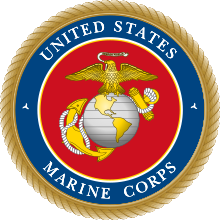|
Rifleman's Creed The Rifleman's Creed (also known as My Rifle and The Creed of the United States Marine) is a part of basic United States Marine Corps doctrine. Major General William H. Rupertus wrote it during World War II following the attack on Pearl Harbor between late 1941 and early 1942, but its first publication was in San Diego in the Marine Corps Chevron on March 14, 1942. His reasoning for writing the Creed is believed to be that he felt that his men had to understand the concept "that the only weapon which stands between them and Death is the rifle...they must understand that their rifle is their life..."[1] In the past, all enlisted Marines would learn the Creed at recruit training. However, in recent years the Creed has been relegated to the back pages of the standard recruit training guide book, and its memorization is no longer considered required for recruits, but its significance is passed through drill instructors to their recruits throughout each cycle. Different, more concise versions of the Creed have developed since its early days, but those closest to the original version remain the most widely accepted.[2] Purpose The Rifleman's Creed continues to stand as a pillar concerning the ethos of the Marine Corps. In recruit training for enlisted Marines and Officer Candidates School for commissioned officers the Rifleman's Creed is inescapable. Whilst its continued recitation varies from company to company, platoon to platoon, its presence is assured during the period of recruit training. The Rifleman's Creed is one of the keystones of the United States Marine Corps doctrine and helps designate that every Marine is, first and foremost, a Rifleman regardless of Military Occupational Specialty (or MOS) designation.[1] Even now, in the United States Marine Corps rifle training data book, given to recruits when undertaking Table 1 of rifle qualification, the Rifleman's Creed is printed within the data book to ensure that prior to picking up a weapon a Marine understands what their rifle means to them and their Corps. The last page of the data book reinforces this ideology with the quote from General Alfred M. Gray Jr., the 29th Commandant of the Marine Corps: "Every Marine is, first and foremost, a rifleman. All other conditions are secondary."[3] The Creed itself utilizes a sense of anthropomorphism in order to coerce Marines into seeing their rifle as more than a simple tool of war. This sense of almost familial attachment that a Marine feels towards their rifle is paramount, as a Marine would never leave a man behind, they would also not leave their rifle.[4][5] Current text
In popular culture
See also
References
|
